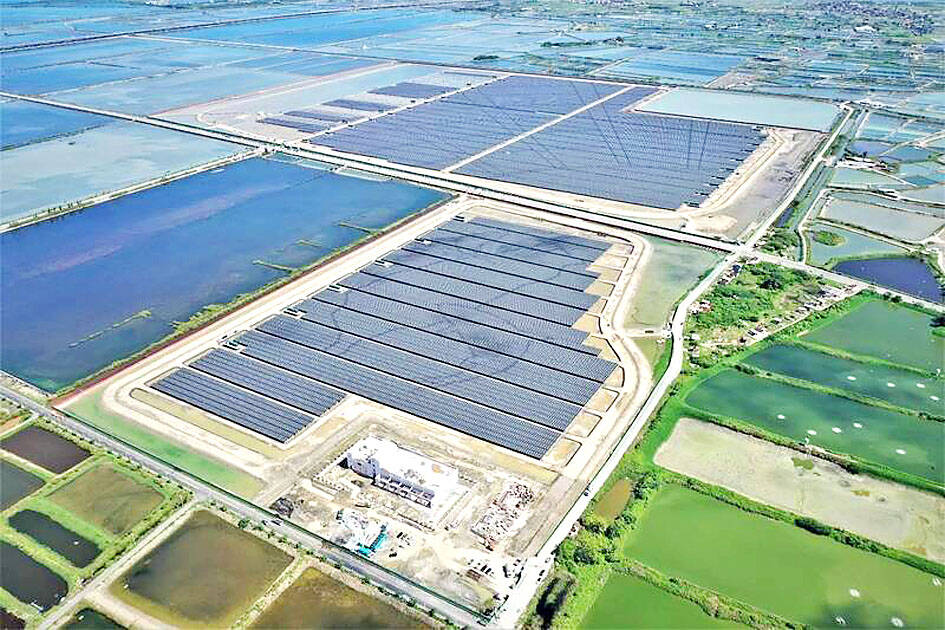A government program to develop solar energy has harmed farmers and threatens Taiwan’s food security, a group of academics said yesterday.
Taiwan’s land use laws have been steadily deregulated to facilitate photovoltaic construction since 2015, but there has been a steady trend away from the principle of sustainable development, the academics said in a petition, which had garnered 80 signatures.
The government must establish clear standards and procedures to select sites for solar installations to minimize the impact on farmers’ and fishers’ livelihoods, the environment and food security, the petition said.

Photo: Taipei Times file
Regulations give officials “virtual carte blanche” to declare farmland to be unsuited for agriculture, National Chung Kung University (NCKU) professor of urban planning Huang Wei-ju (黃偉茹) said.
The land is rezoned for use as solar farms with almost no factual basis, Huang said.
For example, 500 hectares designated as agriculture-only in Changhua County’s Dacheng Township (大城) was rezoned to permit photovoltaic construction, despite 89 percent of the land being intensively cultivated, she said.
Taiwan needs 132,000 to 570,000 hectares for green energy installations to achieve its 2025 target of 40 to 80 gigawatts generated from renewable sources, NCKU professor of urban planning Chao Tsu-yuan (趙子元) said.
That would require a comprehensive rethinking of national land use plans, a process that the government has not gone through yet, Chao said.
Failure to address controversies arising from the selection of solar energy sites would complicate implementation of zoning plans over the next two years, National Chengchi University (NCCU) assistant professor of land economy Tai Hsiu-hsiung (戴秀雄) said.
Green energy zones should be established under the Electricity Act (電業法) and Renewable Energy Development Act (再生能源發展條例), not extemporized by executive order, Tai said.
The effects of renewable energy installations should be more extensively examined in environmental impact assessments, he said.
It would be a mistake for Taiwan to fixate on net zero carbon emissions at the expense of other considerations, or reduce the challenge of mitigating climate change to merely installing renewable energy installations, National Taipei University professor of urban planning Liao Kuei-hsien (廖桂賢) said.
Rushing to build solar and wind farms without adequate planning would lead to a host of long-term problems, including loss of biodiversity and food production, Liao said.

Actor Darren Wang (王大陸) was questioned by prosecutors for allegedly orchestrating an attack on a taxi driver after he was allegedly driven on a longer than necessary route in a car he disliked. The questioning at the New Taipei City District Prosecutors’ Office was ongoing as of press time last night. Police have recommended charges of attempted murder. The legally embattled actor — known for his role in the coming-of-age film Our Times (我的少女時代) — is under a separate investigation for allegedly using fake medical documents to evade mandatory military service. According to local media reports, police said Wang earlier last year ordered a

President William Lai (賴清德) should protect Taiwan Semiconductor Manufacturing Co (TSMC), and stop supporting domestic strife and discord, former president Ma Ying-jeou (馬英九) wrote on Facebook yesterday. US President Donald Trump and TSMC on Monday jointly announced that the company would invest an additional US$100 billion over the next few years to expand its semiconductor manufacturing operations in the US. The TSMC plans have promoted concern in Taiwan that it would effectively lead to the chipmaking giant becoming Americanized. The Lai administration lacks tangible policies to address concerns that Taiwan might follow in Ukraine’s footsteps, Ma wrote. Instead, it seems to think it could

A man in Tainan has been cleared on charges of public insult after giving the middle finger during a road rage incident, as judges deemed the gesture was made “briefly to express negative feelings.” In last week’s ruling at the High Court’s Tainan branch, judges acquitted a driver, surnamed Cheng (程), for an incident along Tainan’s Nanmen Road in September 2023, when Cheng had spotted a place to park his car in an adjacent lane. Cheng slowed down his vehicle to go into reverse, to back into the parking spot, but the car behind followed too closely, as its driver thought Cheng

DEFENSE: The purpose of the exercises is to identify strategies for the government to control risks during tensions, prevent war and bolster national resilience A tabletop exercise series has begun simulating possible scenarios if the Chinese People’s Liberation Army (PLA) launched a war against Taiwan in the guise of a military exercise. The exercise series is jointly organized by National Chengchi University’s Institute of International Relations, Taiwan Center for Security Studies and Asia-Pacific Policy Research Association. Chinese Nationalist Party (KMT) Legislator Chen Yeong-kang (陳永康), former American Institute in Taiwan (AIT) director William Stanton and Taiwan Center for Security Studies director Liu Fu-kuo (劉復國) attended the event in Taipei yesterday. Scenarios that would be simulated include changing political circumstances in the US during US President Donald Trump’s tenure